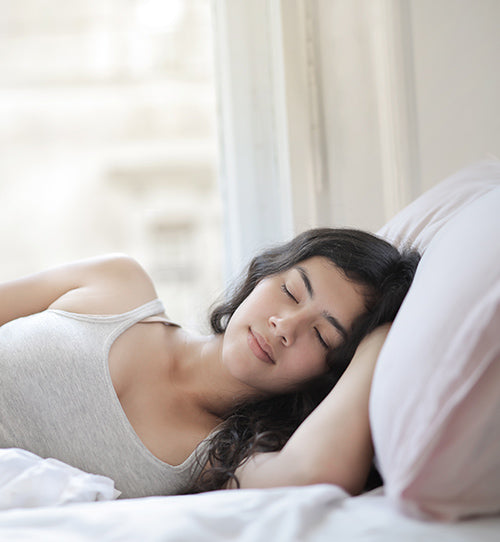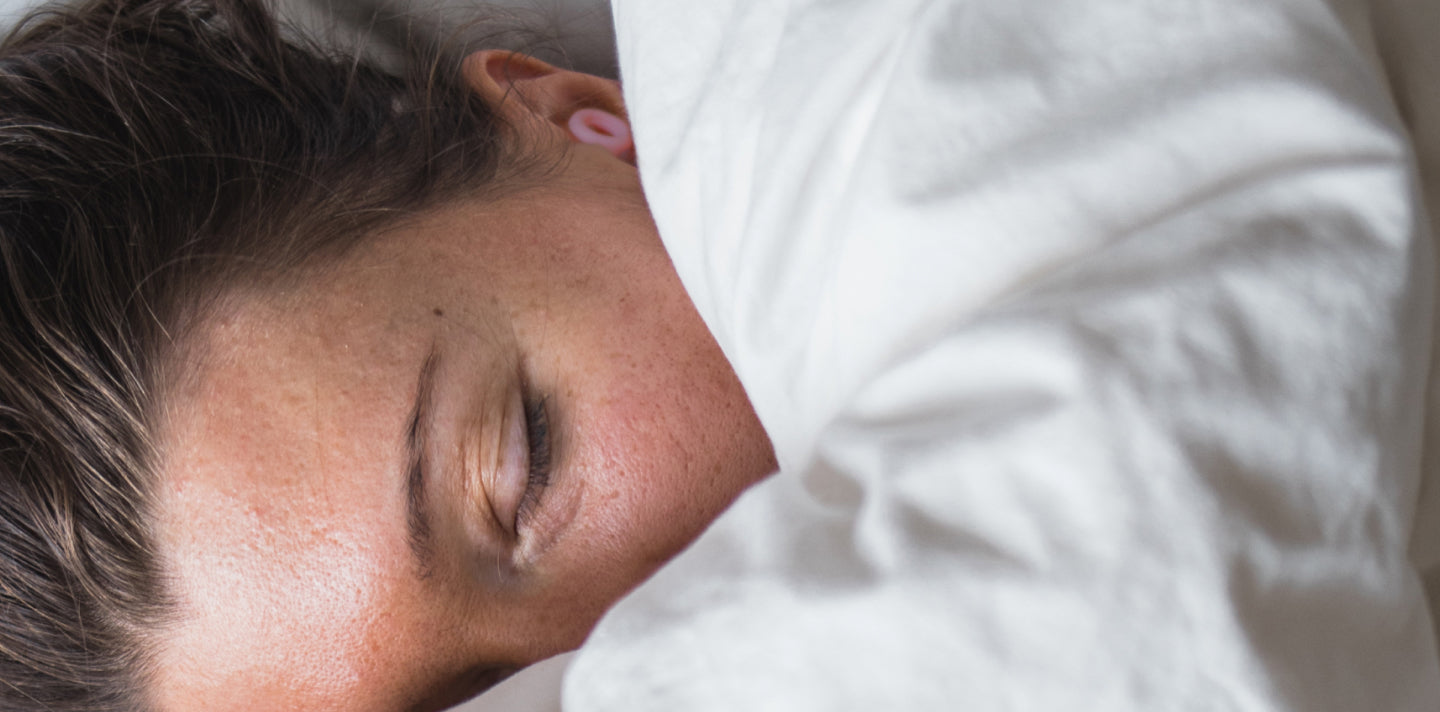Key takeaways:
- Sleep hygiene is key to improving your sleep – consider following a consistent sleep schedule, practicing relaxation techniques and creating an optimal environment for sleep.
- Loop Dream™ earplugs can help reduce noise disruptions during the night for your best sleep ever.
- Prioritizing sleep hygiene can lead to better cognitive function, mood regulation, and overall health.
Sleep is a fundamental part of our lives. While the exact amount of sleep each person needs can vary, adults should ideally get at least seven hours of sleep per night.
We all know how it feels if we fail to get enough sleep, especially if it’s over the course of multiple nights. Tiredness can slowly but surely begin impacting everything we do, affecting our mood, concentration, and ability to function in day-to-day life.
A lack of sleep – and a lack of good-quality sleep – can lead to a whole host of potential health issues, including:
- Lack of concentration
- Tiredness
- Difficulty waking up
- Needing to nap
- Low mood and irritability
- Symptoms of anxiety and depression
- Reduced endurance and physical performance
- Greater risk of hypertension, cardiovascular disease, and other health issues
These things can all have a negative impact on your work, your relationships, and your overall quality of life.
That’s why it’s so important to improve your sleep. And one of the best ways to do that is through better sleep hygiene. “Sleep hygiene” describes a set of good practices when preparing for and going to sleep. In theory, having good sleep hygiene should help you get to sleep more easily, get more sleep, and have a higher quality of sleep. The term has become increasingly common in the last few years, reflecting research and public discourse on the importance of improving sleep and getting enough sleep.
So, without further ado, let’s look at how to improve sleep hygiene – hopefully also improving your wellbeing and overall quality of life.
Establishing a consistent sleep schedule
Having a regular routine each night is an excellent way to mentally prime yourself for sleep. After a few days or weeks, you should begin to associate this routine with sleep, helping you naturally wind down and get to sleep more easily. Figure out a bedtime and wake-up time that allows you to get 7-9 hours of sleep (whatever works for you), and stick to it! It might be hard to stick to at first, but after a few weeks, it should be much easier to keep to your new routine – and you should feel much better for it.
For example, it may be a good idea to start reading a book at a certain time each night shortly before you want to get to sleep. Other common bedtime routines include meditation, breathing exercises, and listening to relaxing music or podcasts.
It’s a good idea to try to go to bed at the same time every night, and wake up at the same time each morning – yes, even on weekends! The occasional long lie is fine (everyone needs a little extra snooze once in a while) but if you get into a habit at the weekends of staying up late and then sleeping in the next morning, it can seriously disrupt your sleep, and make it harder to get back into a routine come Monday morning.
Creating a sleep-friendly environment
One of the keys to improving sleep hygiene is creating a more comfortable sleep environment. When you have the right environment for sleep, you’re more likely to nod off faster, stay asleep throughout the night, and wake up feeling refreshed and rejuvenated.

Try to keep your bedroom cool, ideally between 60-67 degrees Fahrenheit (16-21 degrees Celsius). A cooler temperature can help to lower your core body temperature, making it easier to fall asleep and stay asleep. Your bedroom should also ideally be as dark as possible. Use blackout curtains or blinds if you need to block out external light sources. You should also use soft, dim lighting in the evening to signal to your body that it's time to wind down and prepare for sleep. Avoid bright overhead lights or harsh lighting, as they can stimulate your brain and make it harder to relax.
Comfortable bedding is also key for getting a good night’s sleep. Choose a comfortable mattress and pillows that provide adequate support. Everyone’s different when it comes to whether they prefer a firm or soft mattress, so it may be best to visit a shop to find the perfect mattress for you.
Additionally, keep your bedroom tidy and clutter-free to create a more relaxing environment. If there's a mess in your room, you’re more likely to feel stressed before bed – which is counter-productive when it comes to sleeping well.
Also try to minimize noise disruptions, by using earplugs or white noise machines to reduce external sounds. Loop Dream™ earplugs are specifically designed for maximum sleep comfort. They offer our most powerful noise reduction at 27 dB (SNR), along with in-ear security so they stay comfortably in your ears all night – even when side sleeping. So whether you’re kept up by a noisy street outside or by your partner snoring, these earplugs can help to improve your sleep.
Developing a relaxing bedtime routine
If you’ve had a stressful day, then it can be hard to get to sleep at night. You might toss and turn, thinking (or overthinking) about a million different things. One of the keys to improving sleep hygiene is to get into a relaxing bedtime routine to help you wind down, reduce stress and anxiety, and improve your quality of sleep.
A relaxing bedtime routine can signal to your body and mind that it’s time to wind down for the day, while engaging in a little downtime before bedtime can help to quiet your mind, making it easier to fall asleep when you sink into bed.
There are lots of different ways you can wind down before bed, but some of our favorites are:
- Reading (especially if you choose something light-hearted and easy to read)
- Taking a warm bath – choose to add relaxing bath salts and light candles for a more spa-like experience, if that’s your vibe
- Meditation and mindfulness: Spend a few minutes practicing deep breathing exercises, progressive muscle relaxation, or guided meditation to promote relaxation and prepare your body for sleep
- Stretching or gentle yoga
It’s also important to think about what to avoid before bed. Yes, we’re talking about digital distractions. Modern life involves a lot of stimulation from various sources, from artificial light to loud noises, TVs, mobile phones, and more. Unfortunately, these things can all make it more difficult to get to and stay asleep, so it’s best to avoid them in the time leading up to bedtime. Nowadays, it’s tempting to scroll through social media or watch a TV show in bed, but if you try avoiding these things for a few days, you’ll probably notice an improvement in your sleep.
Some things are a little harder to avoid. For example, you may live in a shared home or a loud neighborhood, in which light and noise can be an issue. If this is the case, using a simple sleep mask can cut out light, and specialized earplugs for sleeping can eliminate or reduce disruptive sounds, helping you sleep more easily.
You should also try to avoid consuming caffeine close to bedtime. It may seem obvious, but it’s surprisingly easy to disrupt your sleep and your ability to fall asleep by consuming caffeine or sugar too late in the day. Caffeine can be particularly problematic as it has a half-life of around five hours in the average person. So if you drink a coffee at 5 pm, you’ll still have around half the caffeine in your body by 10 pm.
To avoid or reduce the negative impacts of sugar and caffeine on sleep, try to limit intake to the mornings and early afternoons.
Managing stress and anxiety
Stress can have an impact on both the quality and quantity of your sleep – which means you can wake up feeling less than fresh with a frayed temper, which can lead to even more stress throughout the day.
Your sleep-wake cycle can be disrupted when you’re stressed, meaning that you may have irregular sleep patterns or wake up frequently during the night – leaving you feeling tired in the morning.
Plus, we all know that feeling of lying awake at night worrying, which can prevent you from falling asleep. It doesn’t matter how many sheep you count, when you’re feeling anxious – whether about something specific, or generalized anxiety – sleep can be hard to come by.
It’s unsurprising, then, that managing your stress and anxiety can lead to better quality sleep. If you’re frequently stressed, then taking steps to address it could be one of the best ways to improve sleep hygiene. You may want to try:
- Relaxation techniques like deep breathing, progressive muscle relaxation and guided meditation to reduce stress levels and promote relaxation.
- Limit exposure to sources of stress: If your stress is work-related, for example, then try to switch off your computer early, and don’t be tempted to check work emails before bedtime.
- Seek professional help: If stress and anxiety are significantly impacting your sleep and overall wellbeing, then consider seeking professional help. A professional therapist, counselor or doctor will be able to recommend the best treatment for you, whether that’s medication or cognitive behavioral therapy.
Additionally, if you find yourself lying in bed unable to sleep for more than 15 or 20 minutes, it may be more beneficial to get up and do something else, rather than lying there with your mind racing. The Sleep Foundation recommends that you get out of bed and sit in another area of your home to do a relaxing activity, like reading, mediation or listening to calming music – and to avoid checking your phone or looking at the clock.
Promoting healthy lifestyle habits
Maintaining a healthy lifestyle is a great way to improve your sleep quality – as well as your overall wellbeing.
Regular exercise has been shown to have a positive impact on sleep quality, with studies showing that adults who exercised for at least 30 minutes a day slept an average of 15 longer than those who didn’t exercise. Other studies have shown that exercise can help to reduce sleep disorders like insomnia, daytime sleepiness and sleep apnea.
Aim for at least 30 minutes of moderate intensity exercise most days of the week – but try to avoid vigorous exercise close to bedtime. Vigorous exercise can be stimulating, which might make it hard to fall asleep, so it’s best to save harder workouts for at least one to two hours before bedtime.
What you eat – and when you eat it – can have an impact on your sleep quality, too. If you consume heavy meals close to bedtime, it can lead to indigestion and discomfort, making it harder to get to sleep. Instead, opt for lighter meals in the evening, and try to avoid particularly spicy or acidic foods, as these may cause heartburn.
It’s also a good idea to limit your caffeine intake in the afternoon and evening, as it can interfere with your ability to fall asleep. So, step away from the 4pm latte, and opt for a green tea instead, which still has caffeine, but much less than a cup of coffee or black tea.
Alcohol and nicotine are often used as sleep aids, but they can also disrupt sleep patterns and contribute to feeling sluggish in the morning. Limit your alcohol and nicotine consumption in the hours before bedtime to help you fall asleep faster, and stay asleep for longer.

Introducing Loop Earplugs
There’s no substitute for a great night’s sleep. But poor sleep is a part of life for many, particularly those of us who have young children, travel regularly, or have other disruptions. If you struggle with bad or inconsistent sleep, getting your sleep hygiene in check could have a huge impact on your overall quality of life.
As well as trying the tips above, Loop Dream earplugs can be a great way to minimize noise disturbances at night and help you get a good night’s sleep. The ear tips follow the natural shape of your ears, making them comfortable to wear all night long. Additionally, the innovative design of the earplug body means pressure is reduced on your ears – so they offer additional comfort, even for side sleepers.
How Loop Dream Earplugs enhance sleep quality
Loop Dream Ear Tips use a mix of memory foam and silicone, following your ear’s shape for better sleep comfort – plus, they come in four different sizes for a perfect fit, even in smaller ears. They offer 27 dB (SNR) of our most powerful noise reduction, muffling nighttime noises like snoring, noisy neighbors and outside traffic, so you can enjoy your dreamiest sleep ever.
When you get a good night’s sleep, you’re more likely to wake up feeling refreshed – reducing stress levels, improving your mood, and supporting your overall wellbeing. Plus, they’re reusable meaning you can wear them over and over again. Simply wipe them clean and leave them to dry before popping them in your ears again at night for another good night’s sleep.
10M+ happy customers
Featured collection
Seeking professional help
If you often struggle with sleep, whether falling asleep or staying asleep, it’s a good idea to consult your doctor or other healthcare professional. Persistent sleep difficulties could be indicative of an underlying sleep disorder like insomnia or sleep apnea – but a professional will conduct a thorough evaluation to identify any conditions that may be contributing to your symptoms.
Sleep problems also often coexist with other conditions such as depression, anxiety and chronic pain. If you have any underlying health conditions, a doctor will be able to assess and diagnose these – and treating the coexisting condition is likely to improve your sleep quality, too.
A professional will also be able to offer personalized recommendations and treatment options tailored to your specific needs. This may include lifestyle modifications, medication or referral to a specialist sleep clinic.
Chronic sleep disturbances can have a significant impact on your quality of life, affecting mood, cognitive function, productivity, and overall health. Seeking professional help can ensure you get the right treatment for you, which in turn can help to improve your sleep quality, and improve your quality of life.
Frequently Asked Questions
What does good sleep hygiene actually mean?
It means creating consistent habits and an environment that support natural sleep. Small daily choices shape how easily your body relaxes at night.
Why is consistency more important than sleeping longer?
Because regular sleep and wake times help regulate your internal clock. Consistency makes falling asleep and waking up feel more natural over time.
How does the bedroom environment affect sleep hygiene?
Light, noise, and temperature directly influence sleep quality. A calm, predictable environment helps your brain associate the space with rest.
Is noise a sleep hygiene issue or a sleep problem?
It’s both. Ongoing noise exposure trains the brain to stay alert, which undermines healthy sleep routines even when you feel physically tired.
Can improving sleep hygiene reduce nighttime awakenings?
Yes, especially when awakenings are triggered by environmental factors. Better routines and a quieter sleep setup support more continuous rest.
Should screens be avoided completely before bed?
Reducing screen use is more important than total avoidance. Dimming lights and limiting stimulation in the last hour helps your body wind down.
How long does it take to see results from better sleep hygiene?
Most people notice changes within a few weeks. Sleep hygiene works gradually by reinforcing predictable sleep signals.
Does sleep hygiene help light sleepers more than deep sleepers?
Light sleepers often benefit the most. Structured routines and reduced noise help limit the small disturbances that disrupt their sleep cycles.
Can earplugs support sleep hygiene without becoming a dependency?
Yes, when used as part of a balanced routine. Earplugs support a quieter environment rather than replacing healthy sleep habits.
What’s one simple change that improves sleep hygiene quickly?
Reducing nighttime noise exposure is one of the fastest improvements. A calmer sound environment helps the body shift into sleep mode more easily.



















